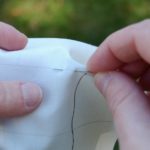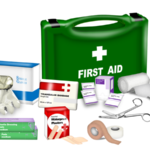
Laundry
From sorting the clothes into darks, lights, whites; to loading them into the washing machine, adding detergent, choosing the correct cycle; to unloading and hanging to dry (whether that be indoors or outdoors); to folding and finally putting away. It’s a long slog and a daily chore that can be made lighter with a helping hand or two.
 Making the Bed
Making the Bed
Being able to make the bed is a simple, and important skill. Changing the duvet cover is always the trickiest part, but it can be really simple. Techniques such as the ‘Burrito method’ are proven to make things much simpler. But I find the easiest way to change the duvet is to take the cover, which is inside out, put my arms into the top two corners, grab two corners of the duvet, and shake the cover so it falls off my arms over the duvet and voila(!) the cover is on. All you need to do then is fasten the bottom. And having a made-up bed at the beginning of every day will definitely put them on the right foot for whatever the rest of the day holds.

Household Maintenance
With more people in the house for longer stretches of time, there is bound to be more to tidy up, and more to clean. Getting the kids to not only tidy their rooms, but to also help with the communal areas in the house will put them in good stead in the future. Learning how to use the vacuum cleaner, the mop, and a duster are all key skills that will help to give them a sense of pride in their home!
 Garden Maintenance
Garden Maintenance
The garden might also need some TLC. Teaching them how to mow the lawn, trim the bushes, preen the plants and weed the flowerbeds, as well as growing flowers and/or vegetables, could create a more caring and nurturing person. According to the RHS Harlow Carr website, some research even suggests children perform better at school if they are involved with gardening and many will develop a greater interest in healthy eating if they grow their own veg too!
 Cooking and Meal Preparation
Cooking and Meal Preparation
Being able to prepare and cook a meal for one or more people is a very important life skill. We’ve all got to eat and to know how to make something that not only tastes good but is simple to make is a must. Teach them how to cook at least five dishes; one vegetarian dish, one breakfast dish, one dish to serve to a group/family, one dessert and one starch. It doesn’t have to be a 5* Michelin meal, but if they can learn to cook five dishes without a cookbook, they will be sorted for life.
 Basic Sewing
Basic Sewing
Being able to sew on a button, patch a hole, or fix a hem by hand are simple skills that can extend the life of many clothes and take just seconds to learn. There are many tutorials online if you’re not aux fair with the basics yourself; and this skill can even extend to adding embellishments to tired clothing, or further, repurposing an old pair of jeans into summer shorts! It doesn’t have to be perfect but it can be a lot of fun!
 Basic First Aid
Basic First Aid
Basic First Aid is important at any age. Knowing what to do if someone has a deep cut or a broken bone might come in handy over the forthcoming weeks as the NHS focuses on the task at hand. And it might also be worth understanding the signs of a heart attack, stroke or concussion. It’s very common to panic in an emergency but if they are well versed in basic first aid, they’ll be able to rely on their instincts and knowledge to come to the rescue with a cool head.
 Changing a lightbulb
Changing a lightbulb
This might seem like a simple task, but it is definitely one worth noting. There are some many different types of bulbs out there, from bayonet to screw, to spotlights, lamps, and chandeliers. Understanding the basics of ensuring the power is turned off, finding something safe to stand on (where applicable), and knowing the correct wattage and fitting, are all key skills to getting you out of the dark and into the light.
 Washing Up
Washing Up
Not everyone has a dishwasher, and not everything can go into a dishwasher either, so to know how to wash up is a very important and daily task. Everyone has their own methods, but I find splitting items into categories works. Starting with the glass items, followed by mugs and crockery, then cutlery, and lastly the cooking utensils (where I usually have to make a fresh bowl). Not only could this encourage pride in the home, but it gets them to understand how much we go through in one day, and perhaps it isn’t always necessary to get another cup or glass out of the cupboard when you’ve already used one ten minutes earlier.
 Taking care of another living thing
Taking care of another living thing
This might not always be possible, depending on your circumstances, but if you have pets or younger family members, they can learn how to take care of them, from getting their food ready to giving them a wash, to teaching them a new skill. It teaches empathy, patience, communication, time management, and flexibility!
Have I missed anything? Please let me know any other suggestion in the North Leeds Mumbler Chat Group. For more ideas on how to entertain the kids whilst at home click HERE.

